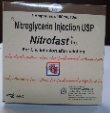|
Each film-coated tablet contains:
USES:
This medication is used to control high
blood pressure, congestive heart
failure, lung congestion and chest pain
especially in heart attack patients. It
decreases the workload on the heart by
enlarging (dilating) blood vessels.
HOW TO USE:
This drug is given by vein (IV), diluted
in a sugar or saline IV solution. The
dosage is based on facts such as your
blood pressure, symptoms, degree of
heart failure or chest pain, age and
overall medical condition. Your body may
get used to the drug (tolerance), may
not work as well and may require an
increase in dosage. This drug is
absorbed by plastics, so the dosage
varies depending on the type of IV you
have. All usage instructions must be
followed carefully.
SIDE EFFECTS:
Headache, dizziness, unusual weakness,
nausea, vomiting and sweating may occur.
If these persist or worsen, notify your
doctor promptly. Unlikely but report
promptly: fainting, loss of bowel or
bladder control, unusually slow or fast
heartbeat, vision problems. Very
unlikely but report promptly: increase
in chest pain (this may result from a
large decrease in blood pressure).
Headache may be relieved by use of
acetaminophen as directed. Headache can
be a sign the medication is working
properly. In the unlikely event you have
a serious allergic reaction to this
drug, seek medical attention
immediately. Symptoms of a serious
allergic reaction include: rash,
itching, swelling, severe dizziness,
trouble breathing. If you notice other
effects not listed above, contact your
doctor or pharmacist.
PRECAUTIONS:
Before using this drug, tell your doctor
your medical history, including:
allergies (especially drug allergies),
head injury/internal bleeding (increased
intracranial pressure), anemia, heart
disease, low blood pressure. Avoid
alcohol while receiving this medication
since it may aggravate side effects. To
avoid dizziness and lightheadedness when
rising from a seated or lying position,
get up slowly. This medication should be
used only when clearly needed during
pregnancy. Discuss the risks and
benefits with your doctor. It is not
known if this drug is excreted into
breast milk. Consult your doctor before
breast-feeding. Caution is advised if
this drug is used in children. A blood
disorder (methemoglobinemia) may occur
rarely in small children. Caution is
advised when this drug is used in the
elderly.
DRUG INTERACTIONS:
This drug should not be used with the
following medications because very
serious (possibly fatal) interactions
may occur: drugs to treat impotence
(e.g., sildenafil, vardenafil, tadalafil).
If you are currently using any of these
medications, tell your doctor or
pharmacist before starting
nitroglycerin. Before using this
medication, tell your doctor or
pharmacist of all prescription and
nonprescription/herbal products you may
use, especially of: heparin, drugs for
high blood pressure (e.g., ACE
inhibitors such as fosinopril or
lisinopril, alpha blockers such as
prazosin or doxazosin, beta-blockers
such as propranolol), antipsychotics for
mental conditions (e.g., chlorpromazine,
haloperidol), other nitrate drugs such
as isosorbide, "dopamine-like" drugs
such as bromocriptine or cabergoline. Do
not start or stop any medicine without
doctor or pharmacist approval.
OVERDOSE:
If overdose is suspected, contact your local poison control center or
emergency room immediately. US residents
can call the US national poison hotline
at 1-800-222-1222. Canadian residents
should call their local poison control
center directly. Symptoms of overdose
may include a persistent, throbbing
headache; dizziness; confusion;
weakness; sweating; changes in heart
rate; changes in vision; flushing;
nausea; and vomiting.
Wallpapers:


CLICK ON PHOTO TO SEE LARGE.
|
